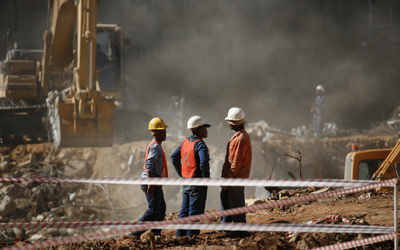SPENDING on public infrastructure — a crucial ingredient for economic growth — remained constant in Wednesday’s budget with R865,4bn committed over the next three years.
The overriding message for the future, however, is that government wants far greater private investment in public assets to fuel economic growth.
The R865,4bn includes planned investments by state-owned enterprises and spending on housing, roads, rail, public transport, water, electricity and community infrastructure.
Over the medium term, infrastructure expenditure by Eskom is projected at R155,3bn and by Transnet at R77bn.
In the case of Eskom this includes expenditure on the Medupi, Kusile and Ingula power plants. At Transnet, weak growth and falling commodity prices have led to expenditure being reprioritised towards upgrading port infrastructure.
While infrastructure spending has in the main been located in state-owned enterprises over the past decade, this is expected to broaden.
In his briefing to journalists, Finance Minister Pravin Gordhan said that infrastructure spending would involve "a wider base of spending and a wider range of projects. There will be more opportunities for the private sector to co-invest with us and more creative ways of project financing."
Among the areas singled out for future co-investment were: partnerships to expand co-investment in economic infrastructure and social facilities; mobilising private sector co-investment in energy technologies that promise rapid results; and partnerships between metro cities and private investors to develop mixed-use, mixed-income precincts near transport networks and jobs.
The budget review acknowledges that infrastructure bottlenecks continue to have a dampening effect on economic growth and private investment.
Over 2015, private investment was stagnant at 0,1% for the first three quarters. As infrastructure constraints ease it is hoped that private sector investment will begin to increase, says the budget review.
Infrastructure grants to municipalities are expected to slow over the second and third years of the medium-term budget as cuts to expenditure are felt.
Direct transfers to local government infrastructure have been reduced by 3.5% over the three-year period as part of the spending reprioritisation process.

Picture: SUNDAY TIMES
SPENDING on public infrastructure — a crucial ingredient for economic growth — remained constant in Wednesday’s budget with R865,4bn committed over the next three years.
The overriding message for the future, however, is that government wants far greater private investment in public assets to fuel economic growth.
The R865,4bn includes planned investments by state-owned enterprises and spending on housing, roads, rail, public transport, water, electricity and community infrastructure.
Over the medium term, infrastructure expenditure by Eskom is projected at R155,3bn and by Transnet at R77bn.
In the case of Eskom this includes expenditure on the Medupi, Kusile and Ingula power plants. At Transnet, weak growth and falling commodity prices have led to expenditure being reprioritised towards upgrading port infrastructure.
While infrastructure spending has in the main been located in state-owned enterprises over the past decade, this is expected to broaden.
In his briefing to journalists, Finance Minister Pravin Gordhan said that infrastructure spending would involve "a wider base of spending and a wider range of projects. There will be more opportunities for the private sector to co-invest with us and more creative ways of project financing."
Among the areas singled out for future co-investment were: partnerships to expand co-investment in economic infrastructure and social facilities; mobilising private sector co-investment in energy technologies that promise rapid results; and partnerships between metro cities and private investors to develop mixed-use, mixed-income precincts near transport networks and jobs.
The budget review acknowledges that infrastructure bottlenecks continue to have a dampening effect on economic growth and private investment.
Over 2015, private investment was stagnant at 0,1% for the first three quarters. As infrastructure constraints ease it is hoped that private sector investment will begin to increase, says the budget review.
Infrastructure grants to municipalities are expected to slow over the second and third years of the medium-term budget as cuts to expenditure are felt.
Direct transfers to local government infrastructure have been reduced by 3.5% over the three-year period as part of the spending reprioritisation process.














 News, views and analysis of Finance Minister Pravin Gordhan's 2016 budget
News, views and analysis of Finance Minister Pravin Gordhan's 2016 budget







Change: -0.47%
Change: -0.57%
Change: -1.76%
Change: -0.34%
Change: 0.02%
Data supplied by Profile Data
Change: -1.49%
Change: 0.08%
Change: -0.47%
Change: 0.00%
Change: -0.04%
Data supplied by Profile Data
Change: -0.34%
Change: 0.03%
Change: -0.10%
Change: -0.22%
Change: -0.69%
Data supplied by Profile Data
Change: -0.28%
Change: -1.15%
Change: -0.07%
Change: -1.21%
Change: -0.22%
Data supplied by Profile Data